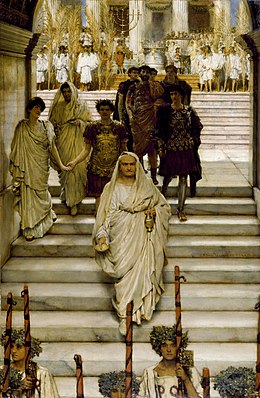
Back Dinastía d'os Flavios AN السلالة الفلافية Arabic Flavilər sülaləsi Azerbaijani Флавіі Byelorussian Династия на Флавиите Bulgarian Flavijevci BS Dinastia Flàvia Catalan Flaviovská dynastie Czech Flaviske dynasti Danish Flavier German
| Roman imperial dynasties | ||
|---|---|---|
 | ||
| Flavian dynasty | ||
| Chronology | ||
|
69–79 AD |
||
|
79–81 AD |
||
|
81–96 AD |
||
| Family | ||
|
||
The Flavian dynasty, lasting from AD 69 to 96, was the second dynastic line of emperors to rule the Roman Empire following the Julio-Claudians, encompassing the reigns of Vespasian and his two sons, Titus and Domitian. The Flavians rose to power during the civil war of AD 69, known as the Year of the Four Emperors; after Galba and Otho died in quick succession, Vitellius became emperor in mid 69. His claim to the throne was quickly challenged by legions stationed in the eastern provinces, who declared their commander Vespasian emperor in his place. The Second Battle of Bedriacum tilted the balance decisively in favor of the Flavian forces, who entered Rome on 20 December, and the following day, the Roman Senate officially declared Vespasian emperor, thus commencing the Flavian dynasty. Although the dynasty proved to be short-lived, several significant historic, economic and military events took place during their reign.
The reign of Titus was struck by multiple natural disasters, the most severe of which was the eruption of Mount Vesuvius in AD 79, which saw the surrounding cities of Pompeii and Herculaneum be completely buried under ash and lava. One year later, Rome was struck by fire and a plague. On the military front, the Flavian dynasty witnessed the siege and destruction of Jerusalem by Titus in AD 70, following the failed Jewish rebellion of 66. Substantial conquests were made in Great Britain under the command of Gnaeus Julius Agricola between AD 77 and 83, while Domitian was unable to procure a decisive victory against King Decebalus in the war against the Dacians. In addition, the Empire strengthened its border defenses by expanding the fortifications along the Limes Germanicus.
The Flavians also initiated economic and cultural reforms. Under Vespasian, new taxes were devised to restore the Empire's finances, while Domitian revalued the Roman coinage by increasing its silver content. A massive building programme was enacted by Titus, to celebrate the ascent of the Flavian dynasty, leaving multiple enduring landmarks in the city of Rome, the most spectacular of which was the Flavian Amphitheatre, better known as the Colosseum.
Flavian rule came to an end on 18 September 96, when Domitian was assassinated. He was succeeded by the longtime Flavian supporter and advisor Marcus Cocceius Nerva, who founded the long-lived Nerva–Antonine dynasty.
The Flavian dynasty was unique among the four dynasties of the Principate Era, in that it was only one man and his two sons, without any extended or adopted family.